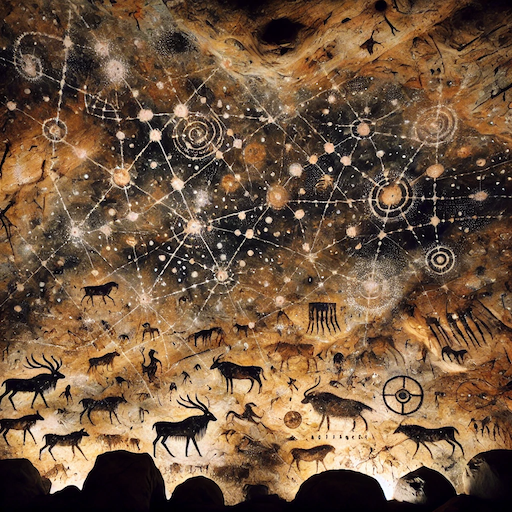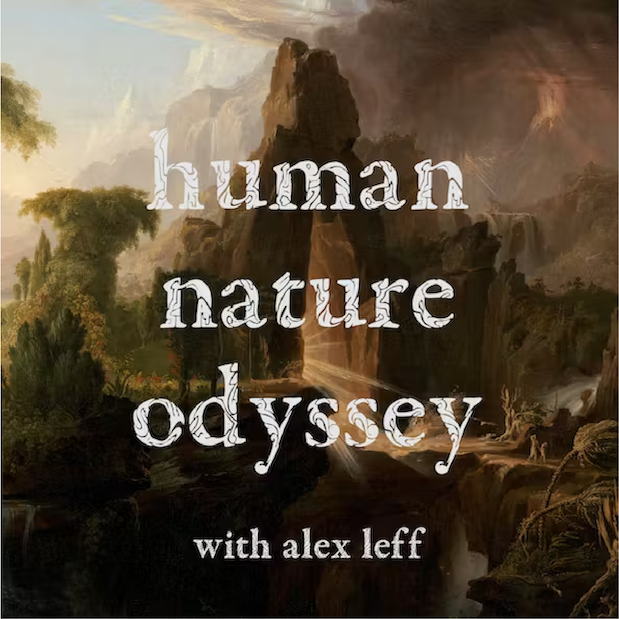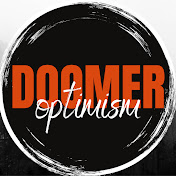It’s Tuesday morning and I didn’t prepare a new post, having been busy helping birds and bats. Maybe, though, the holidays have given you more free time than usual, so that you can afford to take in a podcast episode or two. If so, this post introduces two conversations I’ve had that do a decent job of capturing my recent perspectives. Below, I provide links and overviews of the content of each, in the form of the questions I was asked. Do you already know how I’ll answer each one?
Human Nature Odyssey: Astrophysics for a New Stone Age
About a year ago, I recommended a fantastic podcast called Human Nature Odyssey, by Alex Leff. If you haven’t listened to it, the previous link allows you to get up to speed on past episodes. Alex reluctantly read an assigned book at age 14 that changed his life, as the book has a tendency to do. That book is Ishmael, by Daniel Quinn, which I have touted in a number of posts. It was a key part of the Reading Journey I laid out a while back, further expounded in a dedicated post, and formed a large part of the inspiration behind my proposed Religion of Life.
Alex and I have had a few exchanges over the last year, and he honored me with a spot in his season 2 lineup of Human Nature Odyssey, titled Astrophysics for a New Stone Age. Alex edited the conversation into a tight dialog, adding his customary soundscapes to create a podcast having a higher-than-normal production quality. Paraphrasing Alex’s questions, here is how the flow went:
- What initially drew you to astrophysics?
- Why do you call yourself a “recovering” astrophysicist?
- How do you view science, now from the outside?
- What inspired you to start Do the Math?
- Wait: we’re not going to colonize space?
- How can you say that your “space laser” is far less impressive than a simple amoeba?
- How were you influenced by Daniel Quinn’s writings?
- Could you describe your cancer diagnosis for modernity?
- Why use the vague term “modernity?”
- The modernity cancer has perks: can’t we keep those?
- Are you suggesting that we go back to the Stone Age?
- Do you still lament losing astrophysics if modernity collapses?
- Are you using a map and compass on your journey?
- What aspects of science are valuable in a post-modernity world?
I like the conversation that emerged, and hope you do as well. It should be available through most podcast apps, including this Apple link, and also via YouTube (audio only).
Marriage Proposal (Teaser)
The second conversation was with Josh Kearns on Doomer Optimism (episode 246). And, yes, a marriage proposal pops up. This is a longer conversation than the previous one, happening to cover some similar ground (astrophysics, lunar ranging). But it also delves into religion, which I’m not sure I’ve discussed in other podcasts. It then touches on the fertility decline story and demographic modeling. Near the end, I think Josh implies that I’m fat, or will soon become so. Here is a paraphrased list of questions Josh put to me:
- What does it mean to be a recovering astrophysicist?
- How could you do lunar ranging if the landings were faked?
- What’s at stake in the potential collapse of modernity?
- What’s it like to shed the mythology of progress, and does that make you an outsider now?
- You define modernity as starting with agriculture: is that going too far?
- Could you summarize the Metastatic Modernity arc and messages?
- What’s your plan? Can this be a curriculum? Who’s your audience? Youth salvation?
- Are we preparing today’s students for yesterday’s world?
- What are your triage priorities: institutional or individual?
- Can you explain what human supremacy is and why you focus on it?
- What is your religious background and journey?
- You seem to have arrived at a new religion of sorts: can you describe this?
- Are there inroads to transform religions by carrying forward their best parts?
- Big shift: why is fertility rate falling rapidly and globally?
- How many completely wrong predictions can experts make before they give up?
- How can global energy use peak before global population peaks?
- What is the economic impact of declining energy use?
- If facing near-term demand-driven decline, should we start prepping now?
- Is there anything people fret over that they really don’t need to worry about?
As it happens, I speak slowly enough that playback at 1.5x speed is well-tolerated.
Tangelic Talks
About a month after this post went live, Episode 3 of a new series came out, so I’m appending it here. Here is the page for the episode. Note that a short article accompanies the piece, and additional questions and responses that didn’t make the edited conversation appear in textual form lower on the page. It was AI-generated, so might have some errors. The hosts were somewhat new to my line of thinking, so that this episode might be appropriate for others who haven’t been exposed to such reflections before. For regular consumers of my content, it’s going to be pretty familiar material. The direct YouTube link is embedded below.
Resistance Radio
Also out after this initial posting (February 16, 2025) is a second conversation between myself and Derrick Jensen (the first is linked from this earlier post, which covered modernity and the demographic fertility decline). You can find the conversation at Resistance Radio, or using this link to the episode. The conversation explores growth and its limits, as well as the impossibility of even holding steady at current levels. We also talk about why the obvious is obscure to mainstream culture, and what I would do if I were an energy czar. Derrick asks his guests to suggest sounds from nature for the intro and outro. For the first, I picked a chestnut-backed chickadee (whose chipper sounds make me want to laugh with them). For this, it’s a Douglas squirrel. I wish newts made noises I could use.
Crazy Town
[Added 2025.03.27] My friends from the Post Carbon Institute, Asher Miller, Rob Dietz, and Jason Bradford had me on their Crazy Town podcast recently. I enjoy each individually, and as a group: our conversations are always productive (and laced with humor). In this episode, after offering some laments over lost fragments of modernity, the guys have me define modernity, sketch my path from a technologist/scientist to a modernity critic, touch on why it can’t go on, and offer suggestions for falling out of love with it—while finding supportive community. It almost seems like cheating to do a podcast with such friends.
Views: 2037




In DO246, you say you think the undoing of modernity will take "many generations". I realize it's a fool's errand to try to predict the future… and I'm curious why you think it will take that long? I know others who agree with you and one or two who think it'll happen much faster than that. I agree that humans can and will come up with a wide variety of adaptations to the situations we're faced with that could extend things for a while but I also can imagine plenty of scenarios whereby once the first wheel goes, the rest of them come off rapidly and the modernity cart tips over quite quickly as a result. Once the catastrophes happen at a fast enough pace that recovery isn't possible between catastrophes, it feels like the cart could rapidly (i.e. well within one generation) fall over, especially if we've made minimal efforts to undo our total reliance on the global economy.
As an example of a scenario I think about often: +2C could lead to some significant crop/food failures, which could lead to many more conflicts, which could lead to a depression, which could lead to a world war, one without recovery (unlike the previous two). Given +2C is now expected in the 2040's time frame this could happen fairly soon, and quickly.
On the other hand, if a world war doesn't lead to the use of nuclear weapons, it could lead to most humans muddling along in extreme poverty, still with modernity somewhat intact, and with the oligarchs continuing life somewhat as usual but with a lot less new stuff to buy, assuming there are still functioning refineries, electric grids, etc.
(So many good dystopian movie ideas!)
I suppose this is where the vague definition of modernity allows a wide variety of interpretations for its erasure timescale. If extending the definition to 10,000 years ago, when agriculture began—and thus the mindset of dominion, control, separateness, supremacy—then I do think the modernity mindset will take generations to move beyond. Large disruptions can certainly happen this century, for a variety of reasons, and some might transpire quickly. But the people who make it through a quick disruption are not likely going to become animist hunter-gatherers, nor will their kids, probably. They will try to live the way they know how, preserving practices around agriculture, technology, religion, nation-state, etc. until slowly it makes no more sense and can't be propped up. The generations who lived "full" modernity will be gone, and its memories fade.
Thanks, that makes sense, and yes you're right, it depends on how we define modernity!
Happy Solstice, Merry Christmas, etc. to you; thank you for your blog, I'm extremely grateful for you and your writing.
Tom, thanks for the links to the podcasts. Both were fascinating in themselves, as well as providing new options for listening in future. The depth and wide-ranging nature of the Doomer Optimism episode in particular was enlightening and satisfying.
Having come only relatively recently to this blog (after Metastatic Modernity started, and thanks to a mention on The Great Simplification), I realise now that there are many previous posts that are well worth looking through. I've enjoyed looking into the Reading Journey as well as posts on Ishmael and the development of ideas around a 'Religion of Life' (which is beautiful and inspiring). One of the comments there pointed to the Religious Naturalist Association: have you looked further into how much alignment there is there with your thinking?
After the DO episode I need to go back and look at the posts about demographics. In that conversation you talk about the close correlation between energy use and economic activity and therefore speculate about the economic impacts of reaching peak population pretty soon. However, I wonder whether energy use actually means fossil fuel energy use and therefore whether past correlation might loosen as an increasing amount of energy use is based on renewables? I expect this facet may well be covered in the post, and there may be in part an argument about the fossil energy use embodied in production of renewables hardware … As I say, I should go and do my homework!
So much of what you present just rings true to me, and is beautifully articulated. It's a real pleasure to have found your work. I wonder to what extent the fit between your thinking and mine is related to also being from an essentially science and engineering background (in industry, which I quit about 10 years ago now as it and modernity started to feel increasingly hollow), and being the child of technical academics (with my father having been an astronautical engineer from the 60s to the 90s). Interestingly, he became more religious in his later life – Pascal's wager and all that?).
Hope your Festive Season fits the description.
Mick
Hi Tom
Have you ever read Oswald Spengler's "Decline of the West"? if it is the case, what do you think of it; I think, togheter with Toynbee both have a clue of the organic evolution of the civilizations (beyond causality), following the morphological way of see Nature as Goethe explored before (especially in the case of Spengler) that was brushed aside by the triumph of the Newtonian physics applied to all the fields of knowledge and investigations.
Cheers
David
I am not familiar with these works, but just ran across them in an article that time-traveled into December (says January 2025 in the title bar):
https://www.firstthings.com/article/2025/01/against-christian-civilization
I'm a bit more familiar with Tainter's work on collapse of civilizations (a contemporary).
I have issues with both Spengler and Toynbee. Spengler, a pessimistic determinist, even a fatalist, believes that civilizations have a life span, go through predictable stages and then die/collapse. In effect, civilization is a cultural organism. In his view, civilizations are bound to decline, and human agency or intervention plays no (or a very small) role. His views are somewhat simplistic and lack empirical support. He pretty much ignores economics, resources, and technology. Toynbee, on the other hand, looked at a bunch of collapsed civilizations for what I guess would be called universal patterns. His views are more dynamic. He thought that spiritual renewal might be able to reinforce resilience and stop decline, a vague notion at best. They both see decline as an unavoidable consequence of cultural cycles. (Tainter, on the other hand, uses systems models to understand the complexities of civilization.) Despite some shortcomings, both Spengler and Toynbee have something to offer, and their views can enrich a purely ‘systems thinking’ approach.
When I roam the blogs on human predicament, I meet the same set of people and it is likely you have come across wildancestors.blogspot.com under the title 'What Is Sustainable'. For about ten years Richard Reese regularly posted short essays introducing me to many important books (Ishmael) and people. Recently, he has undertaken a huge writing project on Wild Free & Happy. Richard leads an extremely simple life (he uses library computer for his work) with a carbon foot print just two sizes larger than his actual feet. Wild Free & Happy is freely available for download by writing to richardadrianreese@gmail.com. Can you please help spread the word? I also kindly request all the readers to do the same. It has a wealth of information.
Thanks.
Greetings! 5
In The Beginning 6
Two Legs 16
Fire: Big Juju 26
The Dance of Evolution 31
Megafauna Extinctions 78
Mother Grassland 107
Stumbling into Domestication 120
Animal Domestication 133
Plant Domestication 176
Disease 209
Predators 237
Forests 246
Soil 258
Water 274
Who Are We? 284
Energy 317
Limits 329
Human Webs 338
Climate Catastrophe 358
Climate “Solutions” 387
Helter Skelter 416
Bibliography 421
I wonder how you approach balancing your passions for nature and your creative pursuits. If these podcasts are a window into your perspectives, I can’t wait to listen. Thank you for sharing your insights and giving us something thoughtful to reflect on during this holiday season!